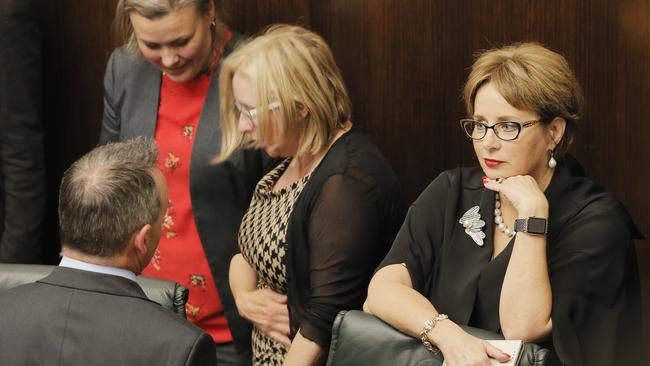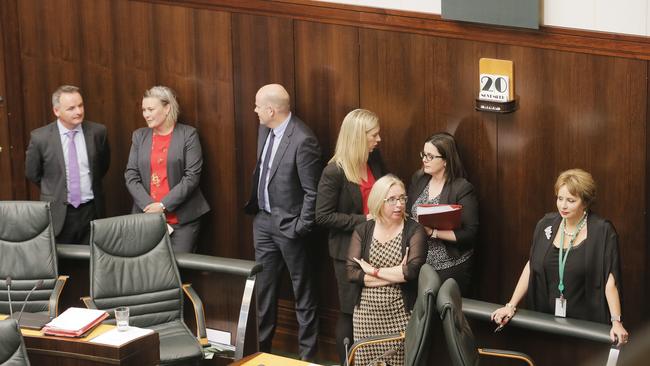Gender law reform vote: What it all means
Speaker Sue Hickey has broken ranks in spectacular style in Tasmania’s House of Assembly by voting to support gender law reform. Here’s what it all means ...

Tasmania
Don't miss out on the headlines from Tasmania. Followed categories will be added to My News.
SPEAKER Sue Hickey has broken ranks in spectacular style in Tasmania’s House of Assembly by voting to support gender law reform.
The legislation, put forward by the Labor opposition and the Greens, was voted through the state’s Lower House Tuesday night after lengthy debate.
Final wrap-up of tonight’s fun here - Tasmania’s Lower House votes for nation-first reforms for transgender Tasmanians https://t.co/jlr7FecQYj #politas
— Emily Baker (@emlybkr) November 20, 2018
The changes were passed by the casting vote of the rogue Liberal Speaker, who voted against her party and with Labor and the Greens.
SUE HICKEY VOTES AGAINST GOVERNMENT ON TRANSGENDER REFORM
EDITORIAL: SIGNIFICANT, BUT NO KILLER
ANALYSIS: BRUISING LESSONS IN DAY OF CHAOS
Here’s what it all means:
WHAT WAS AGREED
- Parents could opt in to having their child’s gender displayed on their birth certificate. The form this takes would be dependent on the registrar, who may choose to use a new form or existing forms to implement this change;
- People aged 16 and older could legally change or remove the gender on their birth certificate via a new document, a gender affirmation declaration, even without reproductive surgery;
- Parents or guardians of children below 16 could apply to change their child’s gender marker on their birth certificate if it represented the best interests of the child. There are provisions if the parents or guardians disagree;

- A lowering of name change applications to people aged 16, instead of 18;
- It would be unlawful to discriminate against someone on the basis of their gender expression — that is, how they present their gender, whether through appearance, speech, mannerisms or personal pronouns;
- The parents of intersex children would have 120 days to register their child’s birth with the registrar, instead of 60 days;
- People who legally change their names would not have their previous name displayed on identity documents if they wish;
- A drafting error from 2014 where the government accidentally left out transgender people from protections from incitement to hatred would be corrected;
- Transgender people would not be forced to divorce, as is required under current laws;
- The birth sex of a person, change of name and change of gender would still be held and known by government, it just wouldn’t be printed on birth certificates if they chose.
The Bill must pass Tasmania’s Upper House, comprising mostly independents, before becoming law.
.@emlybkr on Tasmania’s opt-in gender record: Parents will be able to choose whether gender is marked on their child’s birth certificates. Labor members would be voting in support of the bill.
— Sky News Australia (@SkyNewsAust) November 20, 2018
MORE: https://t.co/ykweMevBOK #PMLive pic.twitter.com/j1DpEoU092
All Liberals except Speaker Sue Hickey voted against the amendments put forward by Labor and the Greens.
WHY ELISE ARCHER WAS WORRIED
- Tasmanians were not aware of all of the amendments before they were debated;
- “Gender expression”, “apparent sex” and “gender affirmation declaration” are without legislative precedent, which Ms Archer argued made it challenging for courts, administrators and statutory officers to interpret and apply;
- The amendments use the terms “sex” and “gender” at different points;
- The rights of parents and children are “fundamentally shifted” with the allowance of legal name and sex changes lowered from 18 to 16;
- If children under 16 want their sex on their birth certificate, and their parents chose not to have it displayed, they would have to seek the approval of a magistrate;
- A person’s legal sex could be changed without validation from a medical professional.


